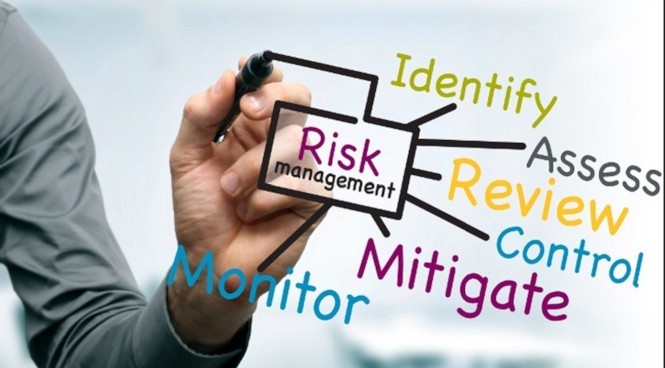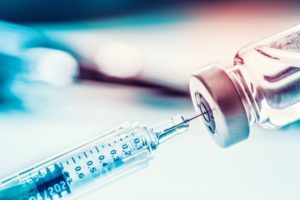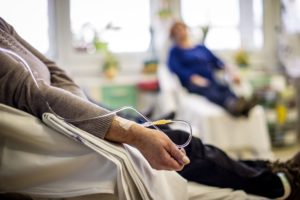
Recently Diagnosed or Relapsed? Stop Looking For a Miracle Cure, and Use Evidence-Based Therapies To Enhance Your Treatment and Prolong Your Remission
Multiple Myeloma an incurable disease, but I have spent the last 25 years in remission using a blend of conventional oncology and evidence-based nutrition, supplementation, and lifestyle therapies from peer-reviewed studies that your oncologist probably hasn't told you about.
Click the orange button to the right to learn more about what you can start doing today.
- You are here:
- Home »
- Blog »
- Multiple Myeloma »
- Everything You Should Know About COVID-19 Vaccines if You Have Cancer
Everything You Should Know About COVID-19 Vaccines if You Have Cancer

“The COVID-19 virus has claimed the lives of over three million people. Still, many are hopeful that vaccinations will provide widespread relief.”
I am a long-term survivor of an incurable blood cancer called multiple myeloma. Though I underwent my induction chemotherapy, autologous stem cell transplant, and radiation therapies more than 25 years ago, I worry about both the COVID-19 virus as well as getting vaccinated.
FDA approved, standard-of-care therapies, prescribed by my board-certified oncologist saddled me with:
- short-term (nausea, alopecia, etc.)
- long-term (chemobrain, CIPN, etc.)
- and late-stage (cardiomyopathy, etc.)
side effects. Most resolved themselves in days or weeks. Some did not. All of those conventional therapies cost 000’s of dollars and resulted in remission, relapse, remission, relapse and “there’s nothing more we can do for you.”
Which is what forced me to take responsibility for my healthcare decision-making. Conventional medicine can do only so much.
The bottom line, for me anyway, is that I make the best decision I can. And that decision is often as much for those around me as much as they are for me. And then I live with the consequences of those decisions. Which is why I chose to be vaccinated against the COVI-19 virus.
If you are a cancer survivor and you’re wondering about getting vaccinated, scroll down the page, post a question or comment and I will reply to you ASAP.
To Learn More about vaccinations and the cancer patient- click now
Thanks and hang in there.
David Emerson
- MM Survivor
- MM Cancer Coach
- Director PeopleBeatingCancer
Recommended Reading:
- A Long-term Multiple Myeloma Survivor’s Diet, Nutrition Plan-
- Multiple Myeloma Side Effects- Radiation-Induced Lumbosacral Plexopathy
- Advanced Multiple Myeloma- End Stage Diagnosis
The COVID-19 virus has claimed the lives of over three million people. Still, many are hopeful that vaccinations will provide widespread relief.
Coronavirus vaccines are rolling out worldwide, and in the U.S, we’re aiming for herd-immunity. While healthcare heroes are working hard to distribute vaccines, medical equipment companies like American BioTech Supply are providing vital resources to help vaccinate the vast majority.
After a year of quarantine and social distancing, plenty of people are eager to get their hands on a vaccine. A shot in the arm is a walk in the park compared to the risks associated with contracting COVID-19.
Still, there’s been some debate over vaccine effectiveness and safety for certain groups of people. Many people have underlying health conditions, such as cancer. For these people, deep consideration and research are required before making the decision.
We want you to make the best decision regarding your health and the health of your community. Here, we’ll address everything you need to know about the COVID-19 vaccine and cancer.
Quelling Your Concerns
Some people have experienced side effects from the various vaccines that are currently available. However, COVID-19 vaccine side effects are usually not severe and are quite standard for any vaccine.
The most common side effects include soreness, tiredness, fever, chills, and nausea. The vast majority of recipients report that all side effects dissipate within 24-48 hours.
Luckily, serious side effects have been incredibly rare. As with any vaccine or medication, there is a risk of an allergic reaction. This will usually be instant and often happens before leaving the administration site. If you feel dizzy or short of breath immediately after receiving the vaccine, stay at the administration site for observation or seek emergency medical attention.
In a few cases, the Johnson & Johnson vaccine has caused blood clots in women between 18 and 50 years old. If you experience intense stomach pains, chest pains, or shortness of breath within two weeks of receiving a J&J vaccine, seek immediate medical attention.
Various Types of Cancer and Vaccine Compatibility
Cancer patients are considered priority recipients at this stage of vaccine administration. People with cancer are more likely to contract severe cases of COVID-19. Even if you are receiving cancer treatment such as radiation or chemotherapy, your doctors will most likely urge you to get the vaccine.
In most cases, you can receive a vaccine without interrupting cancer treatments. Talk to your doctor about various options and which immunization is right for you. Depending on the type of cancer you have and the treatment you are receiving, you may experience varying side effects.
COVID-19 Vaccines and Breast Cancer
In rare cases, CVOID-19 immunizations result in swollen lymph nodes. This type of reaction could feel like prolonged soreness in the armpit and breast area. In some cases there may even be visible swelling. This is caused by an overactive immune response from the body and has been seen in cancer patients receiving immunotherapies.
This lymph node swelling has appeared in mammograms performed not long after vaccine administration. However, it’s not something to be concerned about. The swelling isn’t an indicator of breast cancer or a worsening breast cancer condition. Swelling should reduce in a number of weeks, but if you notice it’s getting worse, contact your doctor.
Cancer Patients Receiving Chemotherapy, Radiation, or Undergoing Surgeries
In most cases, cancer patients receiving chemo or radiation will experience worsened symptoms. Nausea and fatigue are among the symptoms expected to worsen.
Worsening symptoms could be caused by exhaustion; the body needs more recovery time since it’s undergoing treatment and stress related to an underlying illness. Most cancer patients report that symptoms subside within a few days of receiving the shot.
Takeaways for Cancer Patients Considering COVID-19 Vaccination
At this time, it’s crucial to follow the advice and recommendations of your healthcare provider. Express your concerns and talk with your doctor before going through with the vaccination.
Until then, continue to social distance and shelter in place until leading healthcare providers suggest otherwise.



